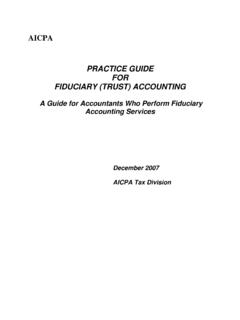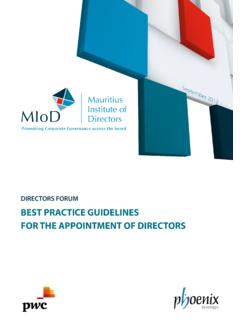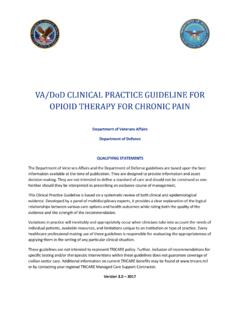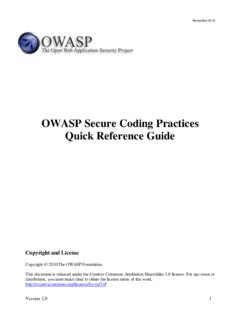Transcription of Records Management: NHS code of practice: Part 1
1 Records Management: NHS Code of PracticePart 1 WithdrawnDHINFORMATION READER BOXP olicyEstatesHR/WorkforcePerformanceManag ementIM & TPlanningFinanceClinicalPartnership WorkingDocument PurposeBest Practice GuidanceROCR Ref:Gateway Ref:6295 TitleRecords Management: NHS Code of PracticeAuthorDH/Digital Information PolicyPublication Date30 March 2006 Target AudienceNHS Records ManagersCirculation ListPCT CEs, NHS Trust CEs, SHA CEs,Care Trust CEs, Foundation TrustCEs, Medical Directors, PCT PECC hairs, NHS Trust Board Chairs,Special HA CEs, Directors ofHR,Directors of Finance, Allied HealthProfessionals, GPs, Royal Colleges,BMA, GMC, Healthcare CommissionDescriptionThe Code of Practice is a guide tothe standards of practice required inthe management of NHS Records ,based on current legal requirementsand professional best practice.
2 Theguidance applies to all NHS recordsand contains details of therecommended minimum retentionperiod for each record typeCross RefHSC1999/053 For The RecordHSC 1998/217 Preservation,Retention and Destruction of GPGeneral Medical Services RecordsRelating to PatientsHSC 1998/153 Using ElectronicPatient Records in Hospitals: LegalRequirements and Good PracticeSuperseded DocsHSC 1999/053 For The RecordHSC 1998/217 Preservation,Retention and Destruction of GPGeneral Medical Services RecordsRelating to PatientsHSC 1998/153 Using ElectronicPatient Records in Hospitals: LegalRequirements and Good PracticeAction RequiredN/ATimingN/AContact DetailsLiz WaddingtonDigital Information PolicyNHSC onnecting for 280 Recipient s UseWithdrawnRecords management .
3 NHS Code of PracticePart 1 WithdrawnWithdrawnPart 1 Section 1 Foreword1 Types of Record Covered by the Code of Practice1 Section 2 Introduction3 General Context4 Monitoring Records management Performance6 Legal and Professional Obligations6 NHS Connecting for Health7 Social Care Records8 Section 3 NHS Records Management9 management and Organisational Responsibility9 Individual Responsibility10 Policy and Strategy10 Record Creation11 Information Quality Assurance11 Record Keeping12 Record Maintenance12 Scanning13 Disclosure and Transfer of Records 14 Retention and Disposal Arrangements15 Appraisal of Records15 Record Closure16 Record Disposal16 Glossary of Records management Terms18 Annex AResources to Support Improvement28 The Role of the Information Governance Frameworkandthe Information Governance Toolkit28 Setting and Achieving the NHS Standard for Records management A Roadmap29 Other Reference Material30 Useful Contacts35iiiContentsWithdrawnAnnex BNHS Connecting for Health37 Annex CLegal and Professional Obligations42 Legal Obligations42 Relevant Standards and Guidelines44 Professional Codes of Conduct44 Part 2 Annex DNotes to Accompany the NHS Records Retention and Disposal Schedules1 Introduction1 Responsibilities and Decision Making1 Interpretation of the Schedules2 Retention Periods3 Who Makes the Decision Regarding Disposal and
4 Destruction of Records ?4 Archives5 Annex D1 Health Records Retention Schedule6 Addendum 1: Principles to be Used in Determining Policy Regardingthe Retention and Storage of Essential Maternity Records55 Annex D2 Business and Corporate (Non-Health) Records Retention Schedule57 Administrative (corporate and organisation)59 Estates/engineering68 Financial72IM & T81 Other82 Personnel/human resources83 Purchasing/supplies86 Annex D3 Electronic Record/Audit Trails88 Annex EApproved Places of Deposit89ivRecords management : NHS Code of Practice Part 1 WithdrawnSection 1 Foreword1. The Records management : NHS Code of Practicehas been published by theDepartment of Health as a guide to the required standards of practice in themanagement of Records for those who work within or under contract to NHSorganisations in England.
5 It is based on current legal requirements andprofessional best The guidance was drafted by a working group made up of representativesfrom the Department of Health, NHS Connecting for Health, the HealthArchives Group and in collaboration with a range of NHS organisations,including representatives from Acute Trusts, Primary Care Trusts, StrategicHealth Authorities, GP practices and professional Code provides a key component of information governance arrangementsfor the NHS. This is an evolving document because standards and practicecovered by the Code will change over time. It will therefore be subject toregular review and updated as of Record Covered by the Code of Practice4.
6 The guidelines contained in this Code of Practice apply to NHS Records of alltypes (including Records of NHS patients treated on behalf of the NHS in theprivate healthcare sector) regardless of the media on which they are may consist of:patient health Records (electronic or paper based, including thoseconcerning all specialties, and GP medical Records ); Records of private patients seen on NHS premises;1 Accident & Emergency, birth, and all other registers;theatre registers and minor operations (and other related) registers;administrative Records (including, for example, personnel, estates, financialand accounting Records ; notes associated with complaint-handling);11 Although technically exempt from the Public Records Act it would be appropriate for NHS organisations totreat such Records as if they were not so 1 ForewordWithdrawnX-ray and imaging reports, output and images;photographs, slides, and other images;microform (ie microfiche/microfilm);audio and video tapes, cassettes, CD-ROM etc;e-mails;computerised Records ;scanned Records ;text messages (both outgoing from the NHS and incoming responses fromthe patient).
7 2 Records management : NHS Code of Practice Part 1 WithdrawnSection 2 Introduction5. This Code of Practice replaces previous guidance as listed below:HSC 1999/053 For the 1998/217 Preservation, Retention and Destruction of GP GeneralMedical Services Records Relating to Patients(Replacement for FHSL(94)(30)).HSC 1998/153 Using Electronic Patient Records in Hospitals: LegalRequirements and Good contained in this Code of Practice draw on advice andpublished guidance available from the Department for Constitutional Affairs(formerly the Lord Chancellor s Office) and The National Archives, and alsofrom best practices followed by a wide range of organisations in both thepublic and private sectors.
8 The guidelines provide a framework for consistentand effective Records management that is standards based and fully integratedwith other key information governance work managers need to be able to demonstrate positive progress in enablingstaff to conform to the standards, identifying resource requirements and anyrelated areas where organisational or systems changes are Governance performance assessment and managementarrangements facilitate and drive forward the necessary changes. Thoseresponsible for monitoring NHS performance, for example Strategic HealthAuthorities (SHAs) and the Healthcare Commission, play a key role in ensuringthat effective systems are in The NHS is provided with support to deliver change.
9 This includes:Setting and Achieving the NHS Standard for Records Management: ARoadmap this can be accessed directly at: or through the Information Governance Toolkit. The Roadmap is an integral part of this Code of 2 IntroductionWithdrawnInformation Governance Toolkit this has been updated to reflect the principles of this Code of Practice(from version 4 onwards).Information Governance policy and implementation teams within NHSC onnecting for Roadmap and Information Governance Toolkit are described in moredetail at Annex Context9. All NHS Records are public Records under the terms of the Public Records Act1958 sections 3 (1) (2). The Secretary of State for Health and all NHSorganisations have a duty under the Public Records Act to make arrangementsfor the safe keeping and eventual disposal of all types of their Records .
10 This iscarried out under the overall guidance and supervision of the Keeper of PublicRecords, who is answerable to The National Archives is the body that is responsible for advising on themanagement of all types of public Records , including NHS Records . TheNational Archives has general oversight of the arrangements for thepermanent preservation of Records in local Records offices, which have beenformally approved by them as Places of Deposit (see Annex E).11. The Introduction to The National Archives Records management : Standardsand Guidancedocument states: A systematic and planned approach to the management of Records withinan organisation, from the moment the need for a record to be created isidentified, through its creation and maintenance to its ultimate disposalensures that the organisation has ready access to reliable information.

















